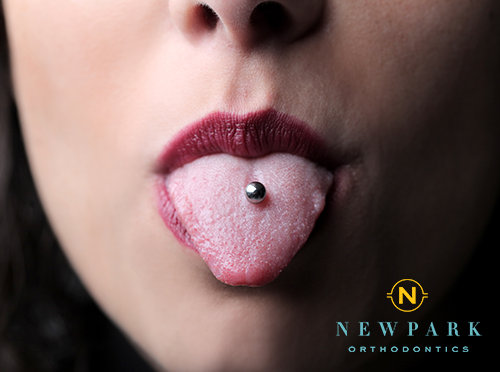Protect Your Orthodontic Investment. Avoid Oral Piercings
You’ve gone through a couple of years of braces to fix your overbite and get those crooked teeth beautifully aligned. Now you’re thinking about an oral piercing to enhance your smile.
Not so fast!
There are lots of ways to express yourself and your individuality. But if you’ve invested in orthodontic treatment to improve your smile, don’t run the potential of harming it with oral piercings.
Popular oral piercings often are seen in the lips and the tongue.
There are at least 13 ways to pierce the lips, and many of them can get in the way of good oral health, according to RDH Magazine. Oral piercings can be in the form of studs or rings. Certain backings on stud piercings can irritate the gums and cause gum recession, and lip rings have been known to wear away healthy tooth enamel and cause a groove to form in teeth.
Tongue piercings create problems from the start. Acute complications that can happen immediately after getting a piercing include tongue swelling, speech difficulty, difficulty swallowing and chewing, and allergic reactions to the metals in the piercing, according to RDH Magazine.
Some people may also experience localized infections, nerve damage and even hemorrhage, given the fact that the tongue is vascular, according to Dentistry IQ.
People with tongue piercings have reported chipping their teeth with them.
Oral piercings also are known to cause gum recession. This means the piercing continuously rubbing against healthy gum tissue causes it to wear away and expose root surfaces of teeth. Over time, this can lead to increased tooth sensitivity and even gum disease.
A study published in 2002 in the Journal of Periodontology found that gum recession occurred in half of the study participants who had worn long barbells in their tongues for two or more years. Researchers also found tooth chipping on molars and premolars in 47 percent of subjects who had worn a tongue piercing for four or more years.
It’s important to remember that an oral piercing is a foreign object that isn’t meant to be in your mouth. It is common for those with oral piercings to inadvertently play with them without realizing it. Lots of people with piercings nibble on them and run them across their teeth, which can lead to abnormal tooth wear, chipped or fractured teeth, and gum recession.
Protect your investment in your beautiful smile by avoiding oral piercings. If you feel like you must do something to enhance your smile after braces, talk to us about teeth whitening options. Achieve a brighter smile without the bling.



